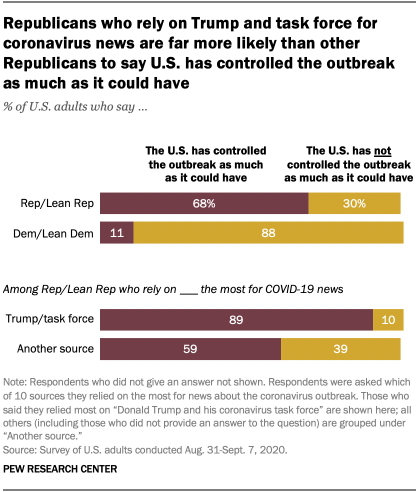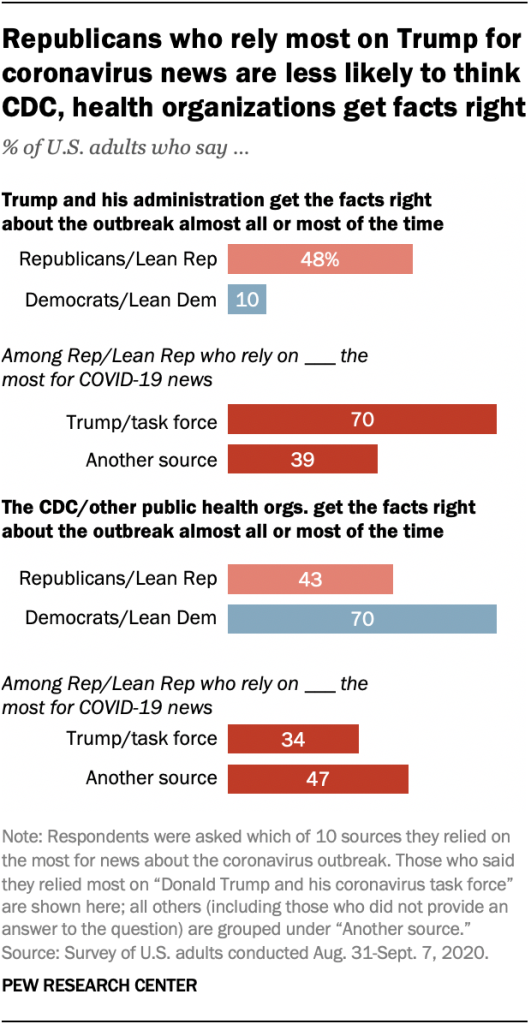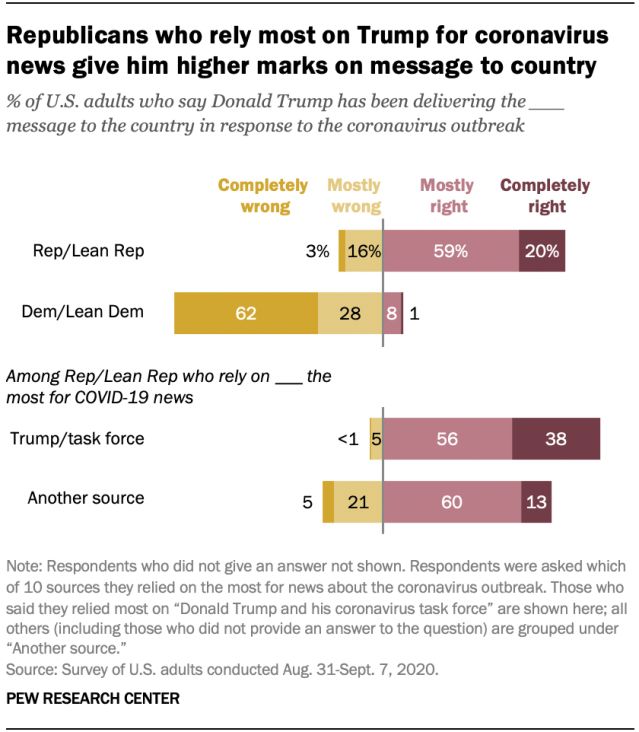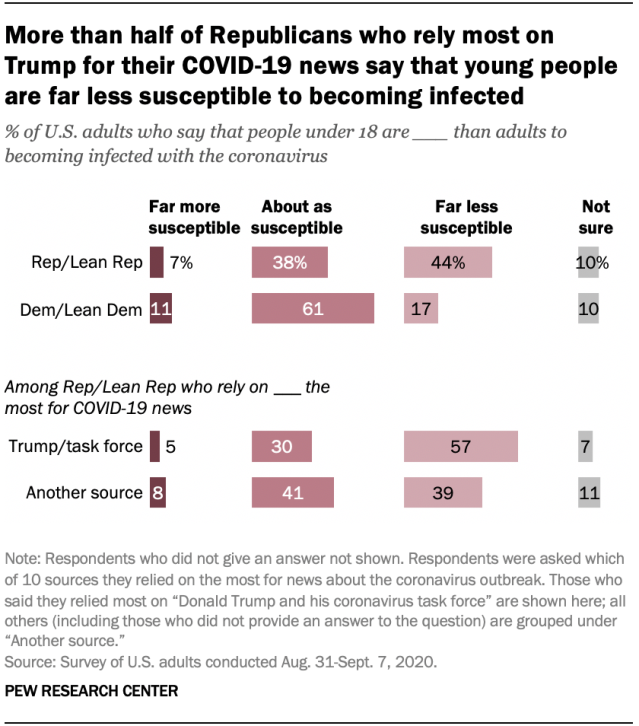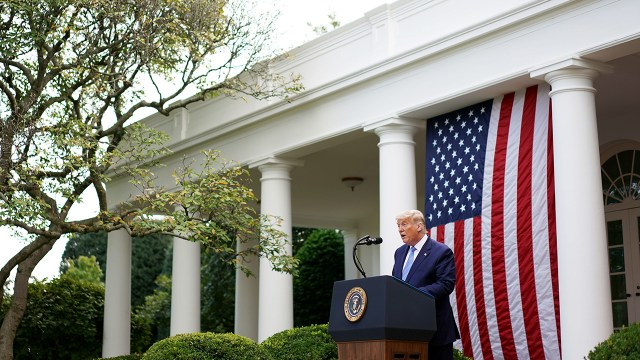
Attitudes about the coronavirus outbreak differ widely by party in the United States. But among Republicans, opinions also differ considerably by source of news, according to a recent Pew Research Center survey.
Republicans and GOP-leaning independents who rely most on President Donald Trump and his coronavirus task force for news about COVID-19 – one of 10 news sources the Center asked about – stand out in several ways in their attitudes about the outbreak. For example, 89% of Republicans in this group say the U.S. has controlled the outbreak as much as it could have, compared with 59% of Republicans who don’t rely most on Trump and the task force.
Republicans who turn to Trump for coronavirus news are also more likely than other Republicans to say the pandemic has been overblown, that Trump is getting the facts about the outbreak right and that public health organizations are not getting the facts right, according to the survey, conducted Aug. 31-Sept. 7 as part of the Center’s American News Pathways project. The poll was fielded before Trump tested positive for the virus and was hospitalized.
Pew Research Center’s American News Pathways project conducted this study to understand how Americans are engaging with and perceiving news coverage of the COVID-19 pandemic – and, in particular, how views among Republicans differ by their sources for COVID-19 news.
For this analysis, we surveyed 9,220 U.S. adults between Aug. 31-Sept. 7, 2020, before President Donald Trump had tested positive for the coronavirus. Everyone who completed the survey is a member of the Center’s American Trends Panel (ATP), an online survey panel that is recruited through national, random sampling of residential addresses. This way nearly all U.S. adults have a chance of selection. The survey is weighted to be representative of the U.S. adult population by gender, race, ethnicity, partisan affiliation, education and other categories. Read more about the ATP’s methodology.
Here are the questions used for this report, along with responses, and the report’s methodology.
Visit our interactive data tool to access the questions included in this report, as well as content about the coronavirus outbreak and the 2020 presidential election.
Respondents to the survey had earlier identified which of 10 types of sources they rely on most for COVID-19 news: Trump and his task force; international news outlets; national news outlets; local news outlets; state and local elected officials; public health organizations; Joe Biden and his campaign; friends and family; online forums; or community newsletters or Listservs. Among Republicans and Republican-leaning independents, large differences emerge between those who rely mainly on Trump and those who rely mostly on other sources. But among Democrats and Democratic leaners, no one group of news consumers stands out in the same way.
Republicans who rely most on Trump and the task force for COVID-19 news are more likely than other Republicans to say the outbreak has not merited the attention it has received. About two-thirds in that group (65%) say news organizations are giving COVID-19 too much attention. That compares with 55% of other Republicans.
On a related question, 75% of Republicans who rely most on Trump and his task force for coronavirus news say the outbreak has been made a bigger deal than it really is, compared with 63% of Republicans who don’t rely most on Trump and the task force.
Differences also emerge around whether various actors are getting the facts right during the pandemic. Among Republicans who rely most on Trump for coronavirus news, 70% say he and his administration get the facts right almost all or most of the time. Among other Republicans, far fewer (39%) say the same.
At the same time, those who get their coronavirus news mainly from Trump and the task force give lower marks to the Centers for Disease Control and Prevention (CDC) and public health organizations, with 34% saying these groups get the facts right almost all or most of the time. That compares with a higher share among other Republicans (47%).
Among Republicans who rely most on the president and task force for COVID-19 news, 38% say he is delivering the completely right message on the subject, compared with 13% among other Republicans. In all, 94% of Republicans who rely on the president for coronavirus news say he is delivering either the completely right or mostly right message. That compares with 72% among other Republicans.
One area where it appears that Republicans who rely most on Trump for COVID-19 news have heard his message is how susceptible people under the age of 18 are to becoming infected with the virus – a subject that has often surfaced in debates over reopening schools this fall. The president has at times claimed that the risk to young people is minimal; the CDC says it is “unclear” whether children are as susceptible to infection as adults.
Around six-in-ten Republicans (including leaners) who rely most on Trump and the task force for COVID-19 news (57%) say people under 18 are far less susceptible to becoming infected than adults, while 30% say they are about as susceptible. But Republicans who don’t rely the most on Trump for coronavirus news are much more divided: 39% say young people are far less susceptible than adults, and 41% say they are about as susceptible.
Many of the perspectives of Republicans who rely most on Trump for COVID-19 news align closely with those of Republicans who only use Fox News channel or talk radio as major sources for political news. These two platforms have audiences that are disproportionately Republican and conservative.
For example, 89% of those Republicans who rely most on Trump for coronavirus news say the U.S. has controlled the outbreak as much as it could, and so do 90% of Republicans who only cite Fox News or talk radio as a major source. Similarly, 94% of those Republicans who rely most on Trump for coronavirus news say his messaging on the outbreak has been completely or mostly right, and virtually the same portion of the Republicans who cite Fox News or talk radio as major sources (96%) say the same.
Note: Here are the questions used for this report, along with responses, and the report’s methodology. Visit our interactive data tool to access the questions included in this report, as well as content about the coronavirus outbreak and the 2020 presidential election.



